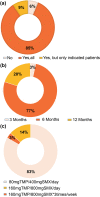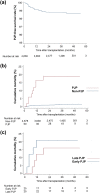Comparison of early and late Pneumocystis jirovecii Pneumonia in kidney transplant patients: the Korean Organ Transplantation Registry (KOTRY) Study
- PMID: 35739203
- PMCID: PMC9226063
- DOI: 10.1038/s41598-022-14580-5
Comparison of early and late Pneumocystis jirovecii Pneumonia in kidney transplant patients: the Korean Organ Transplantation Registry (KOTRY) Study
Abstract
Late Pneumocystis jirovecii pneumonia (PJP) is not rare in the era of universal prophylaxis after kidney transplantation. We aimed to determine the nationwide status of PJP prophylaxis in Korea and compare the incidence, risk factors, and outcomes of early and late PJP using data from the Korean Organ Transplantation Registry (KOTRY), a nationwide Korean transplant cohort. We conducted a retrospective analysis using data of 4,839 kidney transplant patients from KOTRY between 2014 and 2018, excluding patients who received multi-organ transplantation or were under 18 years old. Cox regression analysis was performed to determine risk factors for early and late PJP. A total of 50 patients developed PJP. The number of patients who developed PJP was same between onset before 6 months and onsets after 6 months. There were no differences in the rate, duration, or dose of PJP prophylaxis between early and late PJP. Desensitization, higher tacrolimus dose at discharge, and acute rejection were associated with early PJP. In late PJP, old age as well as acute rejection were significant risk factors. In conclusion late PJP is as common and risky as early PJP and requires individualized risk-based prophylaxis, such as prolonged prophylaxis for old patients with a history of rejection.
© 2022. The Author(s).
Conflict of interest statement
The authors declare no competing interests.
Figures


References
Publication types
MeSH terms
LinkOut - more resources
Full Text Sources
Medical

